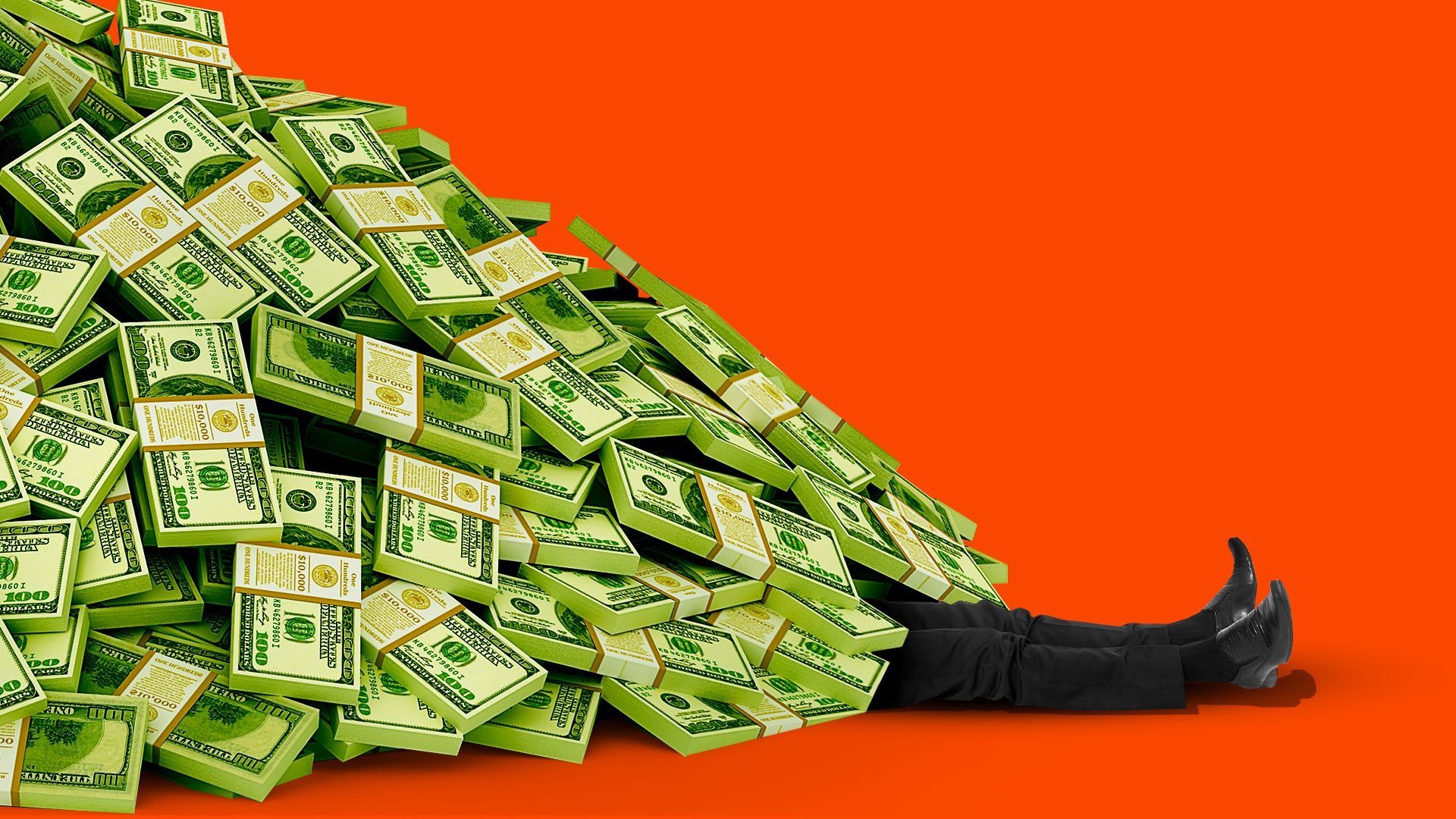| |
| |
| |
| Presented By NetJets |
| |
| Axios Markets |
| By Dion Rabouin ·Mar 15, 2021 |
| Welcome to Monday! I'm writing you from snowy Denver, which was positively covered by a blizzard this weekend. We got more than two feet of snow! - Was this email forwarded to you? Sign up here. (Today's Smart Brevity count: 1,232 words, 4.6 minutes.)
🎙 "A friend should always underestimate your virtues and an enemy overestimate your faults." - See who said it and why it matters at the bottom. |
| |
| |
| 1 big thing: The hoarding economy |
 |
|
| Illustration: Aïda Amer/Axios |
| |
| Americans are locking away greater shares of their money — especially big businesses and the wealthy — a trend that has increased thanks to the coronavirus pandemic and is likely to stick around for some time. Why it matters: The U.S. economy is built on our propensity to spend and the past decade's environment of stubbornly low interest rates, low growth and economic inequality all could be exacerbated in the future as the country leans further into the savings trend. What's happening: Thanks to the pandemic, the tendency of the wealthy socking away their money appears to be getting worse. - A recent survey from Pew Research found that Americans have cut back on spending, especially at upper-income levels, over the past year.
- 32% of "upper income" adults said they were saving more since the pandemic began, compared to 23% of all respondents and 17% of "lower income" adults.
Where it stands: Data from Albion Financial Group show Americans have now socked away around $1.5 trillion in excess savings. - "The savings rate is probably at a fairly high plateau — I don't know if it's a permanent plateau, but it's one that will stick around for longer than just the next 12 months or 18 months," Jason Ware, partner, chief economist and CIO of Albion Financial, told me on the latest edition of the "Market Banter" podcast.
- "We saw this in the years after [the Great Recession]; human behavior is difficult to change."
Why you'll hear about this again: A similar study from Oxford Economics and Barclays found $1.8 trillion in excess savings over the last 11 months, and Gregory Daco, chief U.S. economist at Oxford Economics, estimates the number could rise to $2.5 trillion by this summer. - "I'd expect the savings rate to surge in March and stay quite elevated in April given the economic impact of payments and other transfers" from the $1.9 trillion American Rescue Plan, Daco told me in an email.
This hoarding also is happening at large companies, which have feasted on cheap debt since the Fed announced QE4ever in late March, and kept much of it in cash reserves. - Cash holdings for S&P 500 companies rose to a record $1.9 trillion, while cash and investments held by U.S. nonfinancial companies rated by S&P Global rose 30% to a record $2.5 trillion in the first half of 2020.
- The cash ratio, which compares companies' cash against current liabilities, was 34.3% in Q3, up 15 percentage points from the third quarter of 2019, S&P Global noted in a December report.
- For junk-rated companies, cash ratios have more than doubled in a year, to 50.1% in the third quarter of 2020 from 24.2% in the third quarter of 2019.
|
    |
| |
| |
| Bonus chart: Watching the savings rate |
 Data: U.S. Bureau of Economic Analysis; Chart: Axios Visuals The U.S. savings rate is growing, but largely as a result of savings by the wealthy, the continuation of a long-running theme. - A paper published last month in the National Bureau of Economic Research called "The Saving Glut of the Rich" found that the wealthiest Americans have increasingly hoarded their money over the past 40 years, while investment has decreased and governments along with middle- and working-class people have had to increase their debt loads.
|
    |
| |
| |
| Double bonus chart: Americans behind on rent |
 Data: Center on Budget and Policy Priorities, based on estimates from U.S. Census Bureau's Household Pulse Surveys. Graphic: Will Chase/Axios One point that's not being talked about a lot but will be in the coming 12 months is the large number of deferrals, like eviction moratoriums and food and nutrition assistance, Albion's Ware noted during our interview. - There are "a whole host of obligations that you don't find showing up in traditional debt statistics, but are still real for a lot of American households."
- "There are going to be several thousands of dollars in deferred rent payments that probably will come due for people, so how much of the savings rate is going to be allocated toward making back payments on rent versus allocated demand? We'll see how that flushes out."
Axios' Will Chase writes in our latest Deep Dive: Nearly 1-in-5 renters are behind on rent, one year into the pandemic. - Data from the U.S. Census Bureau show that states like Delaware and Michigan were hit hardest, with a quarter of their renters unable to catch up on payments, while other states hover between 10%–20%.
Why it matters: As recent academic research has shown, renters are getting evicted, with sometimes deadly consequences. |
    |
| |
| |
| A message from NetJets |
| NetJets' most popular aircraft model |
| |
 |
| |
| NetJets' Cessna® Citation Latitude® is designed with your optimum comfort in mind. A new opportunity: This midsize favorite has a generous amount of cabin space and is now available through the NetJets Card Program™. Explore the world's finest fleet. |
| |
| |
| 2. Catch up quick |
| The Federal Reserve's rate-setting committee meets this week with no changes expected in policy, but a consensus poll showed economists see two rate hikes in 2023. (Bloomberg) The likelihood of attending a four-year college dropped to 53%, down nearly 20% in the last eight months, according to a recent survey of high school students from nonprofit ECMC Group. (CNBC) |
    |
| |
| |
| 3. Sluggish spending on activities is hampering the recovery |
 Axios' Will Chase also writes: The pandemic caused a staggering split in the two slices of America's economy, in good and services. Why it matters: The understandably sluggish rebound in spending on services has kept a lid on economic growth. America won't get back to full speed without it, given the services industry's outsized importance to the economy. |
    |
| |
| |
| 4. Goldman Sachs predicts U.S. economy will grow 8% this year |
| Economists at Goldman Sachs raised their GDP growth expectations for the U.S. economy to 8% for 2021 in a note to clients on Sunday night. Why it matters: If Goldman's forecast is correct it would mark the largest economic expansion for the U.S. in a generation. - Not only would 8% annual growth denote a stupendous turnaround from the coronavirus pandemic, it would significantly outpace the firm's growth expectations for the U.S. from as recently as late 2020.
What they're saying: "We have raised our GDP forecast to reflect the latest fiscal policy news and now expect 8% growth in 2021 (Q4/Q4) and an unemployment rate of 4% at end-2021— the lowest among consensus forecasts—that falls to 3.5% in 2022 and 3.2% in 2023. - "But we expect inflation dynamics to mirror those last cycle, and therefore expect this forecast to translate to only 2.1% core PCE inflation in 2023."
Between the lines: Goldman has been exceptionally bullish on the prospects for U.S. growth all year, far outpacing most other Wall Street banks' expectations. - The average growth expectation among Wall Street analysts is 4.7%, according to FactSet, and was 3.9% as recently as November.
- Further, economic growth of 8% with inflation reaching just 2.1% would be nearly unprecedented.
By the numbers: A growth of 8% this year would put U.S. GDP at around $22.6 trillion, marking a full recovery after the economy shrank 4.1% in 2020. - U.S. GDP hasn't grown 8% year over year since 1951, when it totaled $356 billion, or about 1.5% of its current size.
|
    |
| |
| |
| 5. Consumers' confidence is starting to catch up to investors' |
 Data: Investing.com; Chart: Axios Visuals The good news about the economy that asset managers and economists have been crowing about for months is finally starting to make its way into consumer sentiment and confidence measures, as evidenced by the latest survey from the University of Michigan. By the numbers: Michigan's consumer sentiment index in March hit the highest level since March 2020, jumping to 83.0 from 76.8 in February. - The index of current conditions jumped 5 points to 91.5 and the expectations index improved by 7 points to 77.5.
What they're saying: "We had expected that anticipation of another stimulus check along with the gradual reopening of the economy would boost consumer attitudes in February. It looks instead like consumers were unhappy with the pace of progress on both, and now in March things are looking better," Jefferies economists Thomas Simons and Aneta Markowska wrote in a note to clients. - "It also helps that inflation expectations have backed off a little bit. The 1-year ahead inflation expectations index fell to 3.1% from 3.3%, which was the highest level since August 2012."
- "This measure was as low as 2.5% in December, so there has been a rapid shift in thinking on inflation among consumers."
- "The pullback this month is encouraging in that it suggests they may be topping out."
|
    |
| |
| |
| A message from NetJets |
| Multiple ways to fly with NetJets |
| |
 |
| |
| The NetJets Card Program™ offers all-inclusive pricing and guaranteed access to the largest fleet in private aviation. Choose from multiple jet card options with the ultimate convenience of NetJets. Discover ways to fly with all-inclusive pricing. |
| |
| Thanks for reading! Quote: "A friend should always underestimate your virtues and an enemy overestimate your faults." Why it matters: On March 15, 1972, "The Godfather" premiered in New York City. - Based on the book by Mario Puzo and directed by Francis Ford Coppola and starring Marlon Brando and Al Pacino, the film went on to win the Academy Award for Best Picture in 1973.
- The line was said by none other than Don Vito Corleone.
- What's your favorite line from "The Godfather"?
|
Post a Comment
0Comments